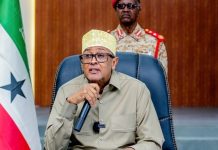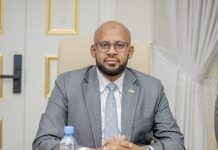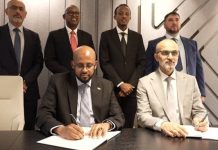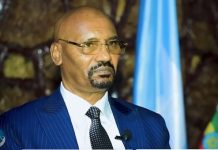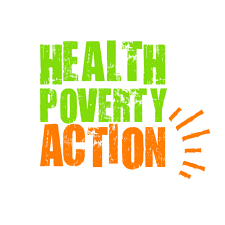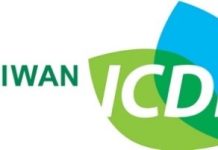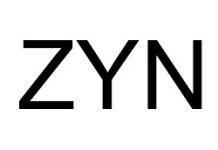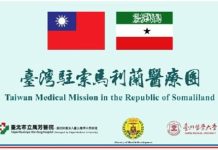TERMS OF REFERENCE For the ENDLINE EVALUATION of the
Somaliland Terminating Oppression of women and girls Programme II (STOP II), Somaliland
- Introduction
Health Poverty Action (HPA) is a UK-based, international, development, Non-Governmental Organization (NGO), with a mission of supporting the poorest and most vulnerable people in their effort to achieve better health and wellbeing. HPA believes that health is a fundamental human right, and that provision of comprehensive primary health care is essential to its realization. HPA seeks to enable the poorest and most marginalized people, excluded from access to health services and information, to realize their right to health and to improve their health and wellbeing through training aimed at building local capacity to deliver sustainable health services and information. HPA gives priority to communities affected by conflict and political instability. HPA also works with communities, health service providers and policy makers on long-term programmes to develop appropriate and responsive primary health care services and to influence policy and practice at all levels.
1.1 HPA in Somaliland
Health Poverty Action’ Somaliland programme office was established and registered by Ministry of planning in 1994 as Health Unlimited and implemented a three-year Primary Health Care project with the financial support of DFID in Sool and Sanag regions of Somaliland. In 1997, DFID funded our ‘Well Women Media Project’, the Saxan Saxo 1 project. With the success of this two years’ project, DFID, EU and UNFPA jointly funded a second phase (2002-2006) of Well Women Media Project (Saxan Saxo II) in 2002. Since 1997, HPA has been broadcasting and producing the now very popular “Saxan Saxo” radio magazine program that addressed reproductive health issues affecting women in Somaliland’s IDP population. Subsequently, UNHCR funded two years, project on health awareness (Information Communication and Information and drama) for IDP/returnees in 2005. In 2008, Health Poverty Action became a consortium partner to the Health System Strengthening Project funded by DFID specifically leading an output of increased public awareness for the two-year period. HPA also implemented similar media projects funded by the Global Fund (2002-2007) and DFID (2007-2009). HPA also implemented a five-year project (2008-2012) entitled “Improving the Reproductive and Sexual Health of Internally Displaced People in Maroodi Jeex region of Somaliland”. “Expanding Sexual and Reproductive Health Services for IDPs / Returnees” in Maroodi Jeex for three years (2011-2013) with the financial support from The European Union; the Sahil Essential Package of Health Services (EPHS) Pilot Project funded by DFID through -consortium led by PSI, the “Health Consortium Somalia” with a focus on the Maternal & Child Health components, supported by DFID in Sahil region for five years (2011-2015) as well as other complementary projects funded by World Food Programme and others. Recently, HPA has been implementing the DFID funded SHINE programme in 9 districts of Somaliland with funds managed through different fund managers. With the Mott MacDonald managed SHINE programme, HPA implemented the EPHS supply programme in 4 districts (Boroma, Zaila, Burao and Odweyne) while with the UNIFEF managed SHINE, in Baki, Lughaya and Buhodle districts. HPA also continued implementing the WFP supported (MCHN & TSFP) programme through 47 Health Centres/MCHs in Maroodi Jeeh, Sahil and Togdheer regions. During the Covid-19 pandemic, HPA implemented a health awareness and WASH intervention project supported by GIZ, in Sahil; and a FIND-funded, Covid-19 antigen-based rapid diagnostic test scale-up project covering selected facilities/communities of Sahil and Hargeisa. Following the end of the SHINE programme, HPA has been implementing a project that responded to the drought situation in Sahil, Togdheer and Awdal regions, under a Humanitarian Programme (HPD) funded by FCDO through UNICEF, a programme that integrates response to the drought situation that affected the target regions through the EPHS programme integrating demand creation, WASH, nutrition, and health components.
Currently HPA is operational in Five main regions of Somaliland, Maroodi Jeex, Sahil, Togdheer, Sool and Awdal. They are implementing MNCH, SGBV, Nutrition project funded by DFID, EC, Caritas and UN agencies.
- 2 Project Context
SGBV and FGM remain part of daily life in most areas of Somaliland – urban and rural and IDP settlements. Due to limited health infrastructure and service provision in the country, victims of complications related to FGM and SGBV have suffered in silence, in some cases losing their lives, having been subjected to the trauma and indignity of having to deal with their cases. This challenge is amplified by the associated stigmatization and stereotypes especially in the case of rape. The majority of SGBV cases are mediated outside of the legal system by elders/traditional leaders through local “customary law”.
In HPA’s 2018 SGBV qualitative research, it was found that 80% of rape victims seek justice through traditional means rather than national law and 40.5% of the victims remained silent. In Somaliland, rape is a taboo and associated with shame for the victims, whereas perpetrators are rarely brought to justice. Cases are usually dealt with by traditional means, with the attacker having to pay compensation to the victim’s father or husband, while the victim is sent away from home without any support.
In regards to FGM, the Somaliland Health and Demographic Survey shows that circumcision is at 98% among women aged 15–49. The most common type of circumcision is pharaonic, performed on 61% of women aged 15-49. Also, the survey indicates that 7% of women had undergone the intermediate type, while 29% had undergone Sunni type. About 20% of girls between 0-14 years are circumcised and half (63% for women aged 15-49 and 62% of girls 0-14 years) of female genital cutting procedures are been performed by traditional circumcisers (SLHDS, 2020).
Previously, HPA implemented STOP I in three pilot areas of Somaliland (Maroodi Jeex, Sahil, and Burao) to improved access to multi-sectoral and coordinated SGBV services and information for women and girls through increasing capacity of 2 national and 30 grassroots level CSOs (existing women’s groups and local NGOs) to provide quality legal, medical and psychosocial support to victims of SGBV; improving coordination and capacity of multi-sectoral state actors to address SGBV and FGC in the target populations; increasing community awareness, behaviour change, and action to support women’s and girls’ rights related to SGBV and FGC in the target pilot areas; and enhancing legal and policy framework towards gender equity and SGBV/FGC elimination through coordination, advocacy and lobbying.
With the following EC funding, HPA partnered with one local organizations, WORDA to implement a 3-years SGBV project in Togdheer and Sool (particularly Burao and Ainabo Districts) regions of Somaliland. The project was implemented between January 2021 and September 2023. It was geared towards providing access to safe homes and medical assistance, giving women and girls a voice in their communities and providing them with the space needed to lead the positive changes in gender relations, dynamics and interaction they would like to see in Somaliland.
1.3 Overall project Objective: increased protection of girls and women from gender-based violence in communities of Somaliland, contributing to the attainment of SDG-5.
1.3.1 Specific Project Objective: increased understanding of the dangers of FGM/SGBV within all levels of society in Somaliland, combined with strengthened mechanisms and capacity to reduce its prevalence.
1.3.2 Expected Project Results:
- ER 1: Increased awareness and attitude change against FGM and SGBV amongst all sections of communities in targeted districts.
- ER2: The debate on the draft anti-FGM law and protective policy frameworks for women is re-ignited by the concerned government ministries.
- ER3: Availability of comprehensive /multi-sectoral SGBV response services increased in the target districts.
- ER4: Capacity of project staff, CSO/LNGO partners, MOHD, law enforcement (police and paralegal) staff working on SGBV response services is increased.
1.4 Projects Geographical Location: Togdheer and Sool (particularly Burao and Ainabo Districts) Regions in the period of January 2021- September 2023.
1.5 Target groups: local NGO partner (WORDA); local NGO staff; grassroots CSO / human rights defenders; SGBV Network members; CHC members; health facilities; MOH managers; health workers; police; judiciary; youth groups; traditional and religious leaders; traditional cutters; and Community Health Workers and counsellors.
1.6 Direct Beneficiaries: women and girls in the target communities, SGBV survivors, married men, Women, boys’ and girls’ clubs and SGBV Victims.
Purpose of the Evaluation:
The purpose of the evaluation exercise is to capture effectively what changes have been accomplished as a result of the project interventions, both in qualitative and quantitative terms comparing project indicators from the baseline survey, through the mid-term review and this final evaluation exercise. It is also expected to highlight lessons learnt and provide information on the nature, extent and where possible, the potential impact and sustainability of the project. Moreover, the consultant will assess the project using the OECD-DAC Evaluation criteria. The OECD-DAC evaluation criteria are the pre-eminent criteria for evaluating development and humanitarian assistance and has defined six evaluation criteria: effectiveness, relevance, efficiency, impact, sustainability and coherence. The consultant will assess the project Relevance, i.e. the extent to which the project is suited to the priorities and policies of the target group, recipient and donor; Determine the project Effectiveness, i.e. a measure of the extent to which an aid activity attains its objectives and as appropriate what were the major factors influencing the achievement or non-achievement of the objectives; assess Efficiency measures of the outputs — qualitative and quantitative — in relation to the inputs, whether the project objectives achieved on time; and determine Impact of the project, i.e. the positive and negative changes produced by a development intervention, directly or indirectly, intended or unintended; and determine the level of project Sustainability that is concerned with measuring whether the benefits of an activity are likely to continue after donor funding has been withdrawn and Coherence for the compatibility of the intervention and how the project interventions fit in the context.
Specifically, the consultant will assess the project design, scope, implementation status and the capacity to achieve the project objectives. It will collate and analyse lessons learnt, challenges faced and best practices obtained during the implementation which will inform future programming strategies. The emphasis on learning lessons speaks to the issue of understanding what has and what has not worked as a guide for future planning. It will assess the performance of the project against planned results. The evaluation will assess the preliminary indications of potential impact and sustainability of results including the contribution to capacity development and achievement of sustainable development goals. The results of the evaluation will draw lessons that will inform the key stakeholders of the project. The evaluation will generate knowledge from the implementation of the project by the implementing partner and reflect on challenges; lessons learnt and propose actionable recommendations for future programming.
2.The scope of the assignment
A technical analysis that evaluates the progress, outcomes and impact against the programme targets. Based on the outputs from the analysis, the evaluator(s) will furthermore present options and recommendations for future programme design and implementation. The final evaluation report should be developed by the evaluator(s) based on the findings.
The consultant will:
- Review, revise or restructure the quantitative and qualitative research tools (Focus Group Discussions and Individual Interviews) previously to generate data required for assessing the progress made by the project against indicators in the project logical framework to feed into final evaluation report.
- Produce an evaluation report (in English) based on the analysis of the quantitative and qualitative data collected. The contents of the reports should include, but not be limited to, descriptive studies and analytical studies. Furthermore, the Evaluation report should detail, but not be limited to, progress against all indicators in the Log frame for the SGBV/FGM programme.
- Key questions to answer as part of the evaluation will be developed alongside HPA staff. However, will likely include:
- To what extent was the project strategy and the project activities relevant in responding to the needs of affected communities?
- To what extent have beneficiaries been involved in the planning, design and implementation of the project?
- To what extent were the intended project aim, the outcomes and outputs (as outlined in the log frame) achieved, and how?
- To what extent did the project reach the targeted beneficiaries of the project aim and outcomes?
- Have strategies for implementation been appropriate in the context?
- What are the unintended consequences (positive and negative) of the project?
- What key changes were brought about by the project to the lives of targeted beneficiaries?
- How will positive changes to the lives of affected communities be sustained after the project ends?
- What changes/factors are recommended to facilitate sustainability?
- What are the key lessons learnt, best practices?
Timing
The exercise will be carried out between the months of November and December 2023
- A detailed inception report for the assignment with work-plan and set of tools will be submitted to HPA for feedback after the literature review and a briefing with HPA staff.
- Training of enumerators will be conducted by the evaluator(s) after the work-plan and data collection tools are finalised.
- Field data collection and input will take about 14 working days depending on the tools to be used.
- The Final Evaluation report exercise will be submitted to HPA no later than 14 days after the data collection is completed.
- The detailed itinerary will be finalised after discussions between the evaluator(s) and HPA Somaliland field office staff.
- Time breakdown:
| Schedule | Working days |
| Literature review and briefing with HPA | 2 days |
| Develop work-plan and research tools | 2 days |
| Field data collection | –
Approx. 8 days of consultancy is required |
| Data input and cleaning | –
Approx. 5 days of consultancy is required or conducted by the research team |
| Compile draft reports | 5 days |
| Revise and produce final report | 4 days |
| Total | Approx. not more than 26 days of consultancy is required |
All collected data will be integrated and analysed by the evaluator(s). The draft reports will be circulated among all key stakeholders involved and their feedback will be used to correct factual errors and address requests for clarification. The evaluator(s) will then prepare the second draft of the reports. Further work may be needed from the evaluator(s) if any remaining errors or clarification requests have not been fully addressed.
- Products
An evaluation report based on the review findings which should identify the following:
- Progress achieved/underachieved against the targets in the log Frame-Evaluation
- Behaviour changes made and impact achieved after the three-year Implementation-Evaluation
- Advantages and disadvantages of the programme strategy- Evaluation
- Strengthens and weakness of HPA as the implementing partner- Evaluation
- The option(s) recommended as the best approach, with rationale -Evaluation
- A separate annex detailing VfM and cost-effectiveness analysis – Evaluation
The products should include case studies.
Deliverables
- Inception report (Evaluation): – Submit inception reports that details the study design, data collection tools, and detailed work plan within 5 days of engagement to be approved by HPA. (draft and final)
- Draft and Final Report: Evaluation report- The consultant will prepare and share draft reports with details of the findings, recommendations and lesson learnt to be reviewed by HPA before final submission of the reports (draft and final)
- Data sets- The consultant should deliver all clean evaluation data entry sets to HPA.
- The Consultant should develop and submit case studies and photos
- Logistics Arrangements
In support of the consultant undertaking this assignment, the HPA Somaliland Office will provide:
Relevant materials related to the study. Transport to and from the field and during the field work. All other costs shall be borne by the consultant. Recruitment and management of enumerators from the local communities (female). Mobilization of local communities and all relevant stakeholders this incl. ministry of health, Project beneficiaries, community leaders etc.
The consultant will be responsible for the following;
Taking care of his/her accommodation and any incidentals. Photocopying/printing of study materials/tools
Training and supervising the research assistants.
Minimum criteria for submission of proposal for bid
The consultancy firm is expected to demonstrate that it has a track record of no less than five (5) years of experience executing endline evaluation in a developing country set-up. The firm should also list the scale of similar projects worked on in the past and the team members to be involved in the research. The firm’s experts are expected to display:
- High sensitivity to conflict-affected settings and diversity issues;
- Good interpersonal, administrative and management skills;
- High level of experience in research methods, data collection, analysis and report writing.
All bidders are required to meet the following minimum requirements in order to qualify for submission of their proposal.
- Previous experience in evaluation studies/ researches. Applicants must have experience in conducting health related research/evaluation preferably in a community/informal setup and of similar or bigger magnitude.
- High level experience of undertaking evaluations in fragile states and difficult environment.
- Capability of the research team: team member(s) shall include public health professionals with a minimum of MPH/MA/MS degree to undertake the proposed evaluation, along with relevant experience.
- Previous experience implementing studies concerning SRH/SGBV/FGM;
- Submission of copies of all supportive documents with the technical proposal is required.
- Knowledge of the project area will be considered a plus.
Payment
The consultant fees shall be paid in three installments according to the following schedule:
- The first payment of 40% advance of the total agreed contractual amount will be made immediately after the signing of the contract agreement and submission of the inception report.
- The second payment of 30% of the total contractual amount shall be made to the consultant upon submission of the first draft report.
- The third payment of 30% of the total contractual amount shall be made to the consultant upon approval and acceptance of the final report.
Bid application
Interested parties should submit:
- Letter of expression of interest and demonstration of capability;
- Curriculum vitae of the consultant/s or firm portfolio;
- Evidence of past experience in undertaking similar assignments (provide at least one example report of similar works undertaken in the past);
- A technical proposal outlining proposed methodology and field and non-field work plan/schedule;
- A financial quotation;
- Contact information for two independent referees.
Canvassing by any bidder will lead to automatic disqualification.
Interested applicants should obtain the relevant documents and templates via procurement@healthpovertyaction.org
These documents should be sent by email to procurement@healthpovertyaction.org: quoting the reference number HPA/SOM/ECSTOP2/04/2023 by 1700 hours East Africa time on or before 29th November, 2023. Any proposals received after the stated time and date will be rejected. Any queries should be sent to: procurement@healthpovertyaction.org
Please note that visitors must comply with Health Poverty Action’s Programme Participant Protection Policy; this will be made available to the evaluator(s) and the evaluator(s) will be required to sign this.


